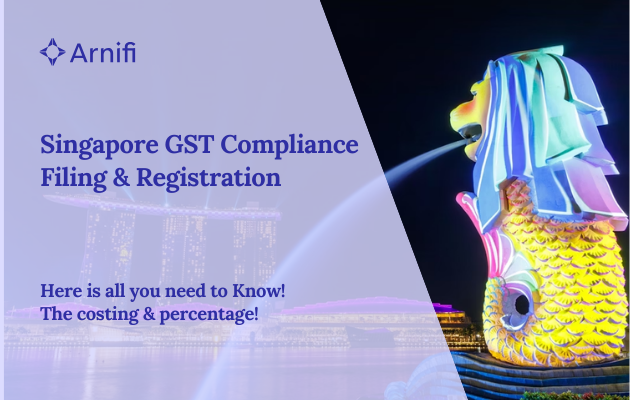How Indians Can Establish a Business in Singapore Easily
by Shethana Aug 29, 2024  16 MIN READ
16 MIN READ

Singapore has a strong and varied economy that has many chances for growth. Its good location, friendly business rules, and solid infrastructure make it a key spot for businesses of any size.
It is one of the simplest places in the world to do business. Singapore supports both new startups and older companies. Its location in Southeast Asia gives direct access to a large market of consumers. This makes it a great place for businesses to expand regionally and internationally.
Why Singapore is a Magnet for Indian Entrepreneurs
For Indian entrepreneurs who want to grow their business around the world, Singapore is an excellent place to consider.
Firstly, Singapore is in the center of Southeast Asia. This key location gives quick access to many potential customers and clients. As a main center for trade and commerce, Singapore also opens doors to the fast-growing Southeast Asian market. The country has great infrastructure, like top-quality ports, airports, and communications. This makes business activities easier and helps with international trade.
In addition, the government in Singapore is known for supporting businesses. They have clear and fair rules that make it easier for foreign businesses to operate. Singapore consistently scores highly in the World Bank’s Ease of Doing Business Index. This shows their focus on helping foreign businesses succeed.
Key Advantages of Setting Up a Business in Singapore
Singapore has many benefits for entrepreneurs and investors. This makes it a great place to start a business. The country has a corporate tax rate of 17%, which is one of the lowest rates in the world.
New businesses can also enjoy different tax exemptions. For example, startups can receive tax breaks during their first few years. Singapore’s tax system helps growth and innovation, which is good for local and foreign companies.
Also, Singapore has a business-friendly environment. It allows easy business operations and has few bureaucratic issues. The government aims for transparency and efficiency. This helps create a smooth experience for business owners.
Deciding on the Right Business Structure
When starting a business, it is important to choose the right structure that fits your goals. The type of business structure affects many things, like liability, taxes, and rules you must follow.
So, take your time to think about the advantages and disadvantages of each option before you register your business with the authorities in Singapore. It’s a good idea to get help from legal or business experts. They can help you make sure the structure you pick supports your long-term plans.
Comparison of Business Entities in Singapore
Singapore offers various business structures to cater to the diverse needs of entrepreneurs:
| Business Structure | Description | Liability |
| Sole Proprietorship | A single individual owns the business. | Unlimited liability |
| Partnership | Two or more individuals own the business. | Unlimited liability |
| Limited Liability Partnership (LLP) | A partnership where partners have limited liability. | Limited liability |
| Private Limited Company (Pte Ltd) | A separate legal entity with limited liability for shareholders. | Limited liability |
Private limited companies are the most prevalent business structure in Singapore due to their limited liability protection and tax benefits. The structure allows up to fifty shareholders, individuals or corporate entities.
On the contrary, sole proprietorships and partnerships expose owners to unlimited liability, meaning their personal assets are at risk if the business incurs debts. An LLP, however, provides limited liability to its partners, safeguarding their assets. Understanding the differences between these structures is crucial for selecting the most appropriate one for your business.
How to Choose the Best Structure for Your Needs
Choosing the right company structure for your business in Singapore depends on your needs and goals. Think about how many shareholders you have, how much risk you can take, and how you plan to grow your business.
Every type of business has its own pros and cons. For example, sole proprietorships are easy and cheap to start, but they do not keep the business and owner separate. This means if the business owes money, the owner is responsible for those debts.
On the other hand, if you incorporate a company, you create a separate legal entity. This helps protect your personal assets if the business has debts. To find the structure that works best for you, it’s a good idea to ask a professional for help.
Preparing for Your Business Journey
Before you send in your application to register a company in Singapore, make sure you have all the important documents ready. You should also understand the laws and rules in Singapore.
Knowing what you need and following the guidelines will help your business succeed. It’s a good idea to work with professionals, like lawyers or business consultants, to help you with the company registration process.
Essential Documents and Requirements
To register a company in Singapore, business owners must meet some requirements set by the Accounting and Corporate Regulatory Authority (ACRA).
First, you need a registered local address for your business. This address will be used for all communications and legal notices. Second, every company must have a local resident director. This director can be a Singapore citizen, a permanent resident, or someone who holds an Employment Pass or EntrePass. Lastly, you have to appoint a company secretary within six months after your company registration.
The company secretary has the job of keeping your company compliant with rules and managing corporate records. Also, make sure to collect all the needed documents, such as details about shareholders and directors, descriptions of business activities, and the company constitution.
Understanding Singapore’s Legal Framework
Compliance with Singapore law is very important for businesses there. The Singapore Companies Act explains the rules and requirements for companies.
Also, businesses need to get the right licenses and permits. These are different for each industry and activity. If businesses don’t follow these rules, they could face fines or risk their operations. That’s why it’s good to learn about these laws and stick to them to avoid any legal issues.
Talking to a legal expert who knows Singapore law can help a lot. They can give useful advice to make sure your business follows the law.
A Beginner’s Guide to Starting a Business in Singapore
Starting a new business in a foreign country can feel tough. However, Singapore makes it easy with its simple procedures.
If you know the steps to follow, you can move through the process confidently and set your business up for success. This guide will give you a step-by-step plan to help you with company incorporation in Singapore.
What You Need to Get Started
Before you start the registration process, it’s important to have a few key things ready. First, pick a good company name and check if it’s available with ACRA.
You also need a local director who meets the residency rules. Plus, a corporate secretary can be appointed after your company is set up, but you must do this within six months. You’ll need a company constitution that details the rules for your business.
Don’t forget that you need a local registered address for your business in Singapore. This can be your office or a service address from a corporate service provider.
Step 1: Securing a Company Name
The company name you pick should match your business and connect with your audience. After you have a few name ideas, it is important to check if the names are available on the ACRA website.
Make sure the name you choose does not break any existing trademarks or look too much like other businesses. When you find a name that is available and just right, you can hold onto it through ACRA for 120 days. This gives you time to finish the other steps for starting your business.
If you are not sure how to do this on your own, you can hire a registered filing agent. They can help with getting your name approved and with other important steps to start your business.
Step 2: Registering Your Business
Once your company name is approved, the next step is to incorporate your company. You need to fill out an online application on ACRA’s BizFile+ portal. You will also need to provide all the required documents.
These documents should include details about your company’s structure, shareholders, directors, share capital, and business activities. You must have a signed consent from your local director and prepare a company constitution. After ACRA reviews and approves your application, you will get a Certificate of Incorporation. This document officially registers your business.
If you can’t find a local resident director, you can hire a local nominee director from a professional service provider. This will help you meet the residency requirement while you keep control of your business.
Step 3: Obtaining Necessary Licenses and Permits
Depending on what your business does, you may need to get certain licenses and permits to run legally in Singapore. For example, if you want to hire foreign employees, you will need licenses from the Ministry of Manpower. If you are in the food and beverage industry, you may need permits from the Singapore Food Agency.
It’s a good idea to research and find out which licenses your industry needs. Then, apply for these licenses through the right government offices. This will help your business follow Singapore’s strict rules.
If you don’t get the permits you need, your business could face fines or even shut down. It is a smart choice to talk to a professional who can help you understand the licensing rules for your specific industry.
Step 4: Setting Up a Corporate Bank Account
A corporate bank account is very important for managing your business money. It helps with processing payments and keeping finance clear. You should open a corporate bank account with a well-known bank in Singapore.
Many local and international banks support foreign entrepreneurs. When you pick a bank, think about things like transaction fees, how easy it is to transfer money internationally, and if they have online banking.
To open the account, you will need your company’s incorporation documents. These include the Certificate of Incorporation and the business profile. It is a good idea to visit the bank in person to finish the account opening steps.
Step 5: Hiring Staff and Understanding Employment Laws
If you want to hire staff, it is important to follow Singapore’s job laws. Learn about the rules from the Ministry of Manpower (MOM). These rules cover employee rights, minimum wage, working hours, and other job-related issues.
When you hire foreign workers, you need to apply for the right work visas. This includes the Employment Pass or S Pass, depending on their skills and pay. These work passes let foreign workers live and work in Singapore legally.
Keep in mind that Singapore has strict rules against illegal hiring. Breaking these rules can lead to serious penalties. It is a good idea to talk to MOM or a legal expert if you have any questions about hiring in Singapore.
Navigating Financial Considerations
Understanding Singapore’s tax system and the funding options can help optimize your finances. You should know the corporate tax rates, the deadlines for submitting returns, and any tax benefits or exemptions that may apply.
Hiring a good accountant or tax consultant can give you helpful advice on planning your taxes. This way, you can make sure to meet your financial responsibilities and get the most out of your tax situation.
Overview of Tax Obligations and Benefits
Singapore has a simple and fair tax system. It uses a flat corporate tax rate. This means all companies pay the same tax rate, no matter how much money they make. This helps both new startups and big companies compete equally.
Moreover, Singapore provides many tax incentives for new businesses. These incentives encourage people to be creative and start new companies. They can cut down your tax costs, which gives you more money to invest in your business.
It is important to understand that Singapore has a territorial tax system. This means only the income earned in Singapore is taxed. This is a big plus for businesses that work worldwide. It can help lower their total tax payments.
Accessing Funding and Grants for New Businesses
Singapore has a lively environment for startups and new businesses. Many government agencies and private groups offer different funding and grant options. These programs are designed to help business owners and promote new ideas in various industries.
Before you apply for any funding or grants, do good research. Find the programs that fit your business goals and area. Each program has its own rules about who can apply and how to do it.
Remember, getting funding can be tough because many people apply. You need a strong business plan, a clear value idea, and a reliable team. Work with incubators, accelerators, or business experts to improve your pitch. This can help you get the funding you need.
Establishing Your Presence in Singapore
Once your business gets started, you need to work smart to make a solid footprint in the Singapore market. This means making connections, learning about local culture, and promoting your brand to gain customers and earn trust in the community.
You can attend networking events, industry conferences, and use online platforms to reach out to possible customers, partners, and mentors. Use these chances to create connections and grow your brand’s influence.
Finding the Right Location for Your Business
Choosing the best place for your business is very important for its success. Singapore has many different types of commercial spaces. You can find busy areas in the city as well as more affordable spots in the suburbs.
When making your choice, think about how easy it is for your target market to get to you. Also, look at how near you are to transportation and if there is skilled labor available. Finding the right business address is not just about picking a local address. It is also about finding a strategic location that helps your business goals.
You should also get advice from real estate agents or business consultants who know the commercial property market in Singapore. They can help you find a space that fits your needs and budget.
Cultural Considerations and Building Local Networks
Singapore has many cultures which mix Eastern and Western influences. It is important to understand these cultures to build good business relationships. Take time to learn about Singapore’s customs and business ways.
Having strong local connections is key for working in the market and getting useful information. You can meet potential partners, clients, and mentors at networking events, industry groups, and business chambers.
Joining community projects shows your commitment to Singapore. This also helps improve the image of your brand.
Expanding Your Business Beyond Singapore
When your business is doing well in Singapore, you can use the country’s strategic location to grow further. Singapore has strong roads, airports, and shipping links. These features make it a great spot for reaching new customers.
You can look for chances to expand to nearby Southeast Asian countries. You can also use Singapore as a way to enter international markets.
Leveraging Singapore as a Gateway to Asia
Singapore is a key entry point to Asia. It offers businesses a great place to start in the large and changing Asian market. With its strategic location and strong trade ties, Singapore gives businesses easy access to local and global markets.
Many large companies have set up their main offices in Singapore. They benefit from the friendly business climate, skilled workers, and the country’s strategic location to help them grow internationally.
By using Singapore’s strong infrastructure, businesses can manage their supply chains better. They can reach new markets and handle the challenges of doing business in Asia more easily.
Strategies for International Growth
Expanding into global markets needs careful planning and smart execution. Start by doing detailed market research. This helps you find potential markets that fit with your products or services.
Next, create a clear business strategy. This should include your target audience, how you plan to enter the market, and your marketing and sales plans. Think about things like cultural differences, language issues, and local laws when entering new markets. Working with local distributors, agents, or joint venture partners can give you helpful advice and make it easier to enter the market.
Conclusion
In conclusion, starting a business in Singapore can be a smart choice for Indian entrepreneurs. The environment is friendly, there are many opportunities, and the support system is strong. Singapore is a great place for business growth. Knowing the legal rules, picking the right business structure, and managing your finances are key steps to set up successfully. If you take a clear path and use what Singapore offers, Indian businesses can grow and become successful in this active area. If you want to start a business in Singapore, be ready to grab the chances for growth.
Frequently Asked Questions
Can an Indian citizen own 100% of a Singapore company?
Yes, with Singapore company registration, foreign ownership is allowed up to 100%. This means Indian citizens can set up and fully control their sole proprietorships or private limited companies.
What are the initial costs involved in setting up a business in Singapore?
Initial costs include the fee for company registration. You may also need to meet compliance requirements. This can involve hiring a corporate secretary and possibly a nominee director, based on your situation.
How long does it take to register a business in Singapore from India?
Foreign entrepreneurs can finish the company incorporation registration process in 1-3 days. This is true as long as they meet all the requirements set by the corporate regulatory authority. It does not matter if they are not Singapore residents.
About Arnifi
Arnifi is digital first Corporate service provider helping companies enter the Middle East region, starting with UAE and Saudi Arabia markets. Founded and backed by professionals from Amazon, Souq and other large companies operating in KSA – the team understands what it takes to succeed as a startup in both UAE and Saudi Arabian markets, apart from going through the setup process multiple times. Arnifi will provide a truly digital experience to entry and scale up of companies both UAE and Saudi Arabia. Discover Tailored solutions and strategic partnerships that propel your business forward. Check out at – www.Arnifi.com for more details.
Also Read: The Complete Guide to Business Setup Costs in Singapore
Top Singapore Packages

Related Articles
Top Singapore Packages



